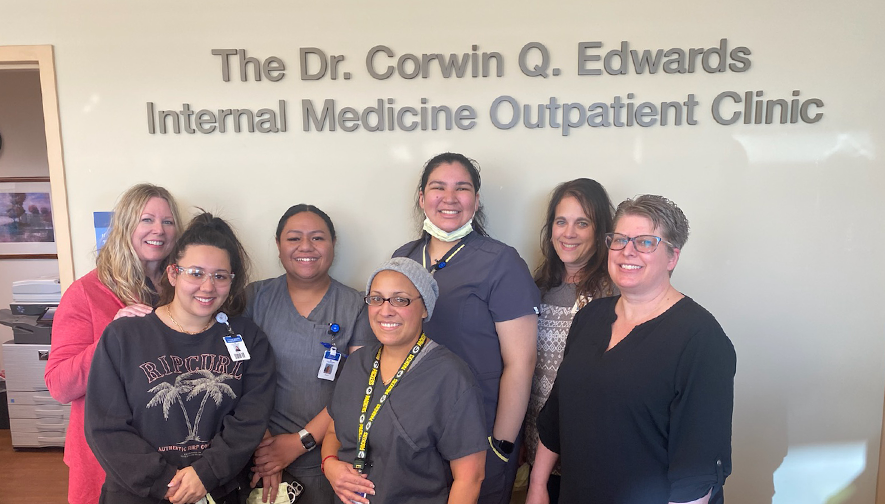
Caregivers rallied together to help a young patient at Edwards Internal Medicine Clinic at Intermountain Medical Center who’d been referred by the emergency department to come in for tests. The patient was a college student who was alone without family or support nearby. The clinic team learned he was dealing with numerous barriers to care, including lack of transportation and food insecurity.
“This was a new patient who didn’t have a primary care doctor or anyone who managed his care,” says Erica Butler, clinic manager. “He’d always been healthy, but his lab draws immediately looked like cancer.”
When caregivers called the patient to make a follow-up appointment, they were unable to reach him by phone. Instead they mailed out a letter to him, only to find out later that his phone had been disconnected. When the patient came in, Erica’s team realized he was dealing with a lot more than his diagnosis.
“We ask questions regarding barriers to care to every patient,” says Vanessa Encinas, a medical assistant, who spoke with the patient and learned about his circumstances. “He didn’t have a job or good transportation, and he wasn’t certain about health coverage. He was at a small college without a dorm or resources, and he was scraping by with what money he did have for food.”
The patient also didn’t have a good option to go home for treatment, she says, as he was from a remote area. To add to this, his family wasn’t sure they’d be able to come out and be with him.
“He was essentially facing this diagnosis and treatment by himself while barely able to take care of himself,” says Vanessa, who has a son that’s a similar age.
“I thought of my son who graduates this year and will be going off to college,” she says. “I can’t imagine this young man having to go through this all by himself.”
Vanessa was determined to get the patient all the help he needed. Dany Saad, MD, a rheumatologist at the clinic, was also very concerned and checked with Vanessa daily to make sure the patient was receiving the imaging and biopsies he needed. From there, the entire team stepped in to help the patient in big and small ways.
Vanessa says after one of the patient’s visits, she and her coworkers went through their drawers and put all the snacks they had into a big bag for him. They also gave him a food voucher for a meal in the hospital café and pitched in to donate groceries to be delivered to his front door.
“He cried and was very thankful for the support,” says Vanessa, who told him, “We want to take care of you and make sure you’re OK. If your family can’t come out here, we want to be your family. We want to help you through this.”
Camille Simpson, RN, says the patient received Medicaid coverage to cover previous visits and his upcoming chemo. “His oncology nurse care manager at the time, Tomoko Tsukamoto, was wonderful,” she says. The Medicaid coverage gave him many resources, from transportation vouchers to a free basic cell phone. Plus, his oncology team ensured he’d have support and someone with him at his treatments.
“All of the caregivers who’ve helped him have been fantastic,” says Erica, who’s care team has continued to check up on the patient, who is continuing cancer treatment and doing well. “None of us had ever seen a patient this young dealing with so much. I think him landing in our clinic was meant to be. Vanessa was supposed to have a connection with him. He was supposed to be here. I hope it would’ve worked out the same way no matter where he went. But I really do feel like he was meant to come to us.”

